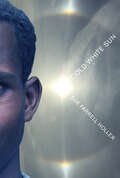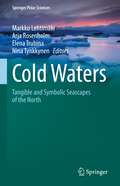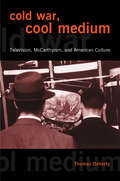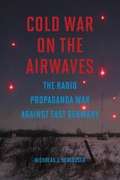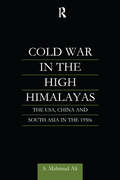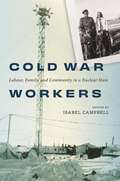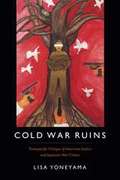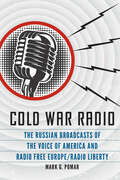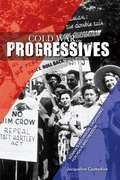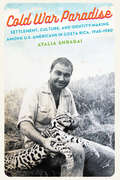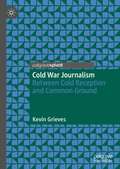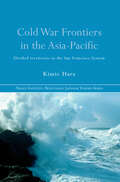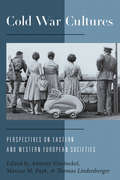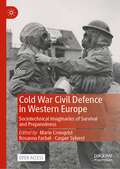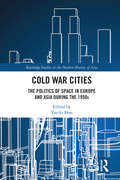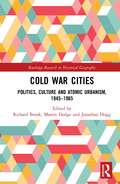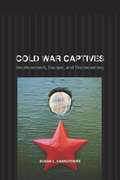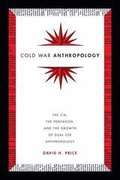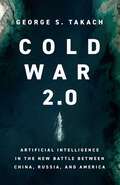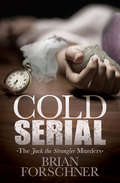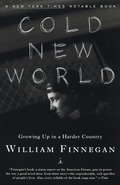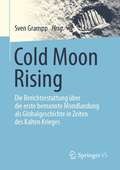- Table View
- List View
Cold White Sun
by Sue Farrell HollerA stranger-than-fiction story based on the real-life experiences of a young boy who was smuggled out of Ethiopia amid political unrest to start a new life from nothing in Calgary, Alberta.Tesfaye lives behind the safe walls of his family’s compound in Addis Ababa, Ethiopia. His father is an important man, Tesfaye goes to one of the best schools in the city, his mother and older sisters keep him fed and cared for. He and his beloved brother, Ishi, can spend their time playing soccer, racing chickens and spying on the guests — as long as they stay away from the sharp horns of the family’s goat and avoid their father’s fiery temper.When rebel forces take over the capital, life becomes more complicated. Tesfaye’s father’s cousin takes him to live in the former imperial palace, and Tesfaye becomes the most favored son. His father takes him along when he gives political speeches and distributes leaflets. It is all very exciting, even if Tesfaye doesn’t pay attention to what the leaflets actually say.And then suddenly his father is arrested, and Tesfaye’s own life is in peril. His mother sends him into hiding in her father’s village, until even that is too dangerous. Tesfaye is put in the care of a human smuggler and embarks on an uncertain, confusing and terrifying journey through Kenya, Europe and finally to Canada, where he is put on a Greyhound bus with ten dollars and instructions to stay on the bus until someone tells him to get off. You are safe now, says the smuggler. You are in Canada. This country will protect you.And so begins his new life in North America, sheltered for a while by fellow expats, threatened by the authorities, shunted from a group home to foster care. But through it all he is plagued by confusion and grief, wondering whether he will ever know what has happened to the family he left behind.Key Text Featuresauthor’s notemaphistorical contextCorrelates to the Common Core State Standards in English Language Arts:CCSS.ELA-LITERACY.RL.6.6Explain how an author develops the point of view of the narrator or speaker in a text.
Cold Waters: Tangible and Symbolic Seascapes of the North (Springer Polar Sciences)
by Arja Rosenholm Elena Trubina Markku Lehtimäki Nina TynkkynenThis book addresses the Arctic and the northern regions by exploring cold waters and northern seascapes. It focuses on cultural discourses and artistic representations concerning the human experience and imagination of how the Arctic Ocean has been explored and used. It aims to assess what is specific to the northern waters vis-à-vis other sea and water areas in the world. The contextual background is provided by the fundamental shift from terra-based thinking towards aqua-based thinking, including the histories of the northern waters and the innovative ocean studies of the last decades. This book will be of interest to readers in Arctic studies and Sea and Ocean studies (including those with interests in literature, history, cultural and film studies, anthropology and politics), Environmental History and Cultural studies as well as in Russian studies. The book has been assembled with a view towards upper-level undergraduate and post-graduate students and scholars and will also be appropriate for courses in the fields mentioned above. The book will be of interest to specialists working in and with Arctic environmental issues. There is a broad array of international academic networks, environmental, governance and cultural associations outside academia whose members may also find the book of interest.
Cold War, Cool Medium: Television, McCarthyism, and American Culture (Film And Culture Ser.)
by Thomas DohertyConventional wisdom holds that television was a co-conspirator in the repressions of Cold War America, that it was a facilitator to the blacklist and handmaiden to McCarthyism. But Thomas Doherty argues that, through the influence of television, America actually became a more open and tolerant place. Although many books have been written about this period, Cold War, Cool Medium is the only one to examine it through the lens of television programming. To the unjaded viewership of Cold War America, the television set was not a harbinger of intellectual degradation and moral decay, but a thrilling new household appliance capable of bringing the wonders of the world directly into the home. The "cool medium" permeated the lives of every American, quickly becoming one of the most powerful cultural forces of the twentieth century. While television has frequently been blamed for spurring the rise of Senator Joseph McCarthy, it was also the national stage upon which America witnessed—and ultimately welcomed—his downfall. In this provocative and nuanced cultural history, Doherty chronicles some of the most fascinating and ideologically charged episodes in television history: the warm-hearted Jewish sitcom The Goldbergs; the subversive threat from I Love Lucy; the sermons of Fulton J. Sheen on Life Is Worth Living; the anticommunist series I Led 3 Lives; the legendary jousts between Edward R. Murrow and Joseph McCarthy on See It Now; and the hypnotic, 188-hour political spectacle that was the Army-McCarthy hearings. By rerunning the programs, freezing the frames, and reading between the lines, Cold War, Cool Medium paints a picture of Cold War America that belies many black-and-white clichés. Doherty not only details how the blacklist operated within the television industry but also how the shows themselves struggled to defy it, arguing that television was preprogrammed to reinforce the very freedoms that McCarthyism attempted to curtail.
Cold War on the Airwaves: The Radio Propaganda War against East Germany
by Nicholas J SchlosserFounded as a counterweight to the Communist broadcasters in East Germany, Radio in the American Sector (RIAS) became one of the most successful public information operations conducted against the Soviet Bloc. Cold War on the Airwaves examines the Berlin-based organization's history and influence on the political worldview of the people--and government--on the other side of the Iron Curtain. Nicholas Schlosser draws on broadcast transcripts, internal memoranda, listener letters, and surveys by the U.S. Information Agency to profile RIAS. Its mission: to undermine the German Democratic Republic with propaganda that, ironically, gained in potency by obeying the rules of objective journalism. Throughout, Schlosser examines the friction inherent in such a contradictory project and propaganda's role in shaping political culture. He also portrays how RIAS's primarily German staff influenced its outlook and how the organization both competed against its rivals in the GDR and pushed communist officials to alter their methods in order to keep listeners. From the occupation of Berlin through the airlift to the construction of the Berlin Wall, Cold War on the Airwaves offers an absorbing view of how public diplomacy played out at a flashpoint of East-West tension.
Cold War in the High Himalayas: The USA, China and South Asia in the 1950s
by S. Mahmud Ali S Mahmud AliThis text examines elite-insecurity perceptions in India, Pakistan and the USA in the 1950s. The book highlights the consequent linkages in alliance-building efforts and the subsequent triangular covert collaboration against Communist China, especially along Tibet's Himalayan frontiers. This secret alliance had an unexpected fall-out on the Kashmir dispute between India and Pakistan. Lastly the book examines the divergence of Indo-Pakistani security policies along fundamental cleavages since the 1960s.
Cold War Workers: Labour, Family, and Community in a Nuclear State
by Isabel CampbellWhen Canada sought to protect its borders and aid its allies during the Cold War, many people were recruited to build the emerging security state: as construction and maintenance workers, engineers, members of the armed forces, medical researchers, and research subjects. Security work transformed the lives of individuals, families, and communities in ways that were both predictable and surprising, and both beneficial and harmful; the militarization and colonization of Indigenous lives and lands was especially disruptive.The opening essays of Cold War Workers intimately portray the complicated effects of Cold War labour upon Indigenous lives. Elmer Sinclair, a residential school survivor and member of the Canadian Armed Forces, achieved equality with white men through his militarized masculinity. His more positive professional experience contrasts with those of Indigenous workers on northern radar lines, many of whom lost languages, connections to the land, and other elements of traditional cultures as they sought new skills and better employment. Diverse Indigenous experiences of Cold War security work set the scene for the second set of essays, which explore the impact of security preoccupations on marginalized groups – the study of extreme isolation through scientific experimentation on human subjects; the targeting of gay men with psychiatric labelling to enforce an idealized masculinity; and the restriction of gender mobility in the Canadian military, and the pushback from servicewomen.Cold War Workers raises questions about the influence of settler-colonial masculine institutional values on those who laboured for the Cold War state and society. By comparing the experiences of different types of workers, families, and communities, this volume reveals how race, gender, and privilege affected people in varied and sometimes unexpected ways.
Cold War Social Science
by Hamilton Cravens Mark SoloveyFrom World War II to the early 1970s, social science research expanded in dramatic and unprecedented fashion in the United States. This volume examines how, why, and with what consequences this rapid and yet contested expansion depended on the entanglement of the social sciences with the Cold War.
Cold War Ruins: Transpacific Critique of American Justice and Japanese War Crimes
by Lisa YoneyamaIn Cold War Ruins Lisa Yoneyama argues that the efforts intensifying since the 1990s to bring justice to the victims of Japanese military and colonial violence have generated what she calls a "transborder redress culture." A product of failed post-World War II transitional justice that left many colonial legacies intact, this culture both contests and reiterates the complex transwar and transpacific entanglements that have sustained the Cold War unredressability and illegibility of certain violences. By linking justice to the effects of American geopolitical hegemony, and by deploying a conjunctive cultural critique--of "comfort women" redress efforts, state-sponsored apologies and amnesties, Asian American involvement in redress cases, the ongoing effects of the U.S. occupation of Japan and Okinawa, Japanese atrocities in China, and battles over WWII memories--Yoneyama helps illuminate how redress culture across Asia and the Pacific has the potential to bring powerful new and challenging perspectives on American exceptionalism, militarized security, justice, sovereignty, forgiveness, and decolonization.
Cold War Radio: The Russian Broadcasts of the Voice of America and Radio Free Europe/Radio Liberty
by Dr. Mark G. PomarCold War Radio is a fascinating look at how the United States waged the Cold War through the international broadcasting of Voice of America (VOA) and Radio Free Europe/Radio Liberty (RFE/RL). Mark G. Pomar served in senior positions at VOA and RFE/RL from 1982 to 1993, during which time the Reagan and Bush administrations made VOA and RFE/RL an important part of their foreign policy. VOA is America&’s &“national voice,&” broadcasting in more than forty languages, and is charged with explaining U.S. government policies and telling America&’s story with the aim of gaining the respect and goodwill of its target audience. During the Cold War, the VOA Russian Service broadcast twenty-four hours a day, seven days a week. RFE/RL is a private corporation, funded until 1971 by the CIA and afterward through open congressional appropriations. It broadcast in more than twenty languages of Central and Eastern Europe and Eurasia and functioned as a &“home service&” located abroad. Its Russian Service broadcast news, feature programming, and op-eds that would have been part of daily political discourse if Russia had free media. Pomar takes readers inside the two radio stations to show how the broadcasts were conceived and developed and the impact they had on international broadcasting, U.S.-Soviet relations, Russian political and cultural history, and the dissolution of the Soviet Union. Pomar provides nuanced analysis of the broadcasts and sheds light on the multifaceted role the radios played during the Cold War, ranging from instruments of U.S. Cold War policy to repositories of independent Russian culture, literature, philosophy, religion, and the arts.Cold War Radio breaks new ground as Pomar integrates his analysis of Cold War radio programming with the long-term aims of U.S. foreign policy, illuminating the role of radio in the peaceful end of the Cold War.
Cold War Progressives: Women's Interracial Organizing for Peace and Freedom
by Jacqueline CastledineIn recognizing the relation between gender, race, and class oppression, American women of the postwar Progressive Party made the claim that peace required not merely the absence of violence, but also the presence of social and political equality. For progressive women, peace was the essential thread that connected the various aspects of their activist agendas. This study maps the routes taken by postwar popular front women activists into peace and freedom movements of the 1960s and 1970s. Historian Jacqueline Castledine tells the story of their decades-long effort to keep their intertwined social and political causes from unraveling and to maintain the connections among peace, feminism, and racial equality. Postwar progressive women and their allies often saw themselves as members of a popular front promoting the rights of workers, women, and African Americans under the banner of peace. However, the Cold War indelibly shaped the contours of their activism. Following the Progressive Party's demise in the 1950s, these activists reentered social and political movements in the early 1960s and met the inescapable reality that their agenda was a casualty of the left-liberal political division of the early Cold War era. Many Americans now viewed peace as a leftist concern associated with Soviet sympathizers and civil rights as the favored cause of liberals. Faced with the dilemma of working to reunite these movements or choosing between them, some progressive women chose to lead such New Left organizations as the Jeannette Rankin Brigade while others became leaders of liberal "second wave" feminist movements. Whether they committed to affiliating with groups that emphasized one issue over others or attempted to found groups with broad popular-front type agendas, Progressive women brought to their later work an understanding of how race, class, and gender intersect in women's organizing. These women's stories demonstrate that the ultimate result of Cold War-era McCarthyism was not the defeat of women's activism, but rather its reconfiguration.
Cold War Paradise: Settlement, Culture, and Identity-Making among U.S. Americans in Costa Rica, 1945–1980
by Atalia ShragaiIn the wake of the Cold War, a diverse group of U.S. immigrants flocked to Costa Rica, distancing themselves from undesirable U.S. policies at home and abroad. Enchanted with Costa Rica&’s natural beauty and lured by the prospect of cheap land, these expatriates—former government employees, businessmen and privileged bourgeois, dissident Quakers and self-seeking hippies, farmers and ecologists—sought a new life in a country that was often dubbed the Switzerland of Central America.Cold War Paradise is a social and cultural history of this little-studied immigration flow. Based on extensive oral histories of these immigrants and their diverse writings, ranging from women&’s club cookbooks to personal letters, Atalia Shragai examines the motivations for immigration, patterns of movement, settlements, and processes of identity-making among U.S. Americans in Costa Rica from post–World War II to the late 1970s. Exploring such diverse themes as gender, nature, and material culture, this study provides a fresh perspective on inter-American relations from the point of view of ordinary U.S. emigrants and settlers. Shragai traces the formation and evolution of a wide range of identifications among U.S. expats and the varied ways they reconstructed and represented their individual and collective histories within the broader scheme of the U.S. presence in Cold War Central America.
Cold War Journalism: Between Cold Reception and Common Ground
by Kevin GrievesThis book explores Cold War journalism and journalists as threat, representing ‘enemy’ systems and ideologies. The book also examines Cold War aspirations of forging transnational journalistic connections across the Iron Curtain as well as finding common journalistic ground within the East and West blocs. The book shines a critical light on overly idealistic visions for that journalistic common ground, drawing on primary archival source material to investigate journalists and reporting work, journalistic content and journalistic venues during the Cold War era. This is not a book about traditional war correspondence – rather, it is about the rhetorical battles and the ideological fronts that have shaped and continue to shape our world. By fully understanding how journalism and journalists have intersected with hostile barriers and divisions in the past, we can have a more nuanced understanding of the current global media environment.
Cold War Frontiers in the Asia-Pacific: Divided Territories in the San Francisco System (Nissan Institute/Routledge Japanese Studies)
by Kimie HaraAfter World War II, many regional conflicts emerged in the Asia-Pacific, such as the divided Korean peninsula, the Cross-Taiwan Strait, the ‘Northern Territories’, (Southern Kuriles) Takeshima (Dokdo), Senkaku (Diaoyu) and the Spratly (Nansha) islands problems. These and other disputes, such as the Okinawa problem in relation to the US military presence in the region, all share an important common foundation in the post-war disposition of Japan, particularly the 1951 Peace Treaty. Signed by forty-nine countries in San Francisco, this multilateral treaty significantly shaped the post-war international order in the region, and with its associated security arrangements, laid the foundation for the regional Cold War structure, the "San Francisco System." This book examines the history and contemporary implications of the "San Francisco System," with particular focus on its frontier problems. Drawing on extensive archival research and in-depth analysis, Kimie Hara uncovers key links between the regional problems in the Asia-Pacific and their underlying association with Japan, and explores the clues for their future resolution within the multilateral context in which they originated. Cold War Frontiers in the Asia-Pacific will appeal to students and scholars interested in international relations of the Asia-Pacific region, diplomatic history and Japanese diplomacy.
Cold War Encounters in US-Occupied Okinawa
by Mire KoikariIn this innovative and engaging study, Mire Koikari recasts the US occupation of Okinawa as a startling example of Cold War cultural interaction in which women's grassroots activities involving homes and homemaking played a pivotal role in reshaping the contours of US and Japanese imperialisms. Drawing on insights from studies of gender, Asia, America and postcolonialism, Koikari analyzes how the occupation sparked domestic education movements in Okinawa, mobilizing an assortment of women – home economists, military wives, club women, university students and homemakers – from the US, Okinawa and mainland Japan. These women went on to pursue a series of activities to promote 'modern domesticity' and build 'multicultural friendship' amidst intense militarization on the islands. As these women took their commitment to domesticity and multiculturalism onto the larger terrain of the Pacific, they came to articulate the complex intertwinement of gender, race, domesticity, empire and transnationality that existed during the Cold War.
Cold War Cultures
by Marcus M. Payk Thomas Lindenberger Annette VowinckelThe Cold War was not only about the imperial ambitions of the super powers, their military strategies, and antagonistic ideologies. It was also about conflicting worldviews and their correlates in the daily life of the societies involved. The term "Cold War Culture" is often used in a broad sense to describe media influences, social practices, and symbolic representations as they shape, and are shaped by, international relations. Yet, it remains in question whether -- or to what extent -- the Cold War Culture model can be applied to European societies, both in the East and the West. While every European country had to adapt to the constraints imposed by the Cold War, individual development was affected by specific conditions as detailed in these chapters. This volume offers an important contribution to the international debate on this issue of the Cold War impact on everyday life by providing a better understanding of its history and legacy in Eastern and Western Europe.
Cold War Crucible: The Korean Conflict and the Postwar World
by Masuda HajimuAfter World War II, the major powers faced social upheaval at home and anti-colonial wars around the globe. Alarmed by conflict in Korea that could change U.S.-Soviet relations from chilly to nuclear, ordinary people and policymakers created a fantasy of a bipolar Cold War world in which global and domestic order was paramount, Masuda Hajimu shows.
Cold War Civil Defence in Western Europe: Sociotechnical Imaginaries of Survival and Preparedness
by Casper Sylvest Marie Cronqvist Rosanna FarbølThis open access edited collection brings together established and new perspectives on Cold War civil defence in Western Europe within a common analytical framework that also facilitates comparative and transnational dimensions. The current interest in creating disaster-resilient societies demands new histories of civil defence. Historical contextualization is essential in order to understand what is at stake in preparing, devising, and implementing forms of preparedness, protection, and security that are specifically targeted at societies and citizens. Applying the concept of sociotechnical imaginaries to civil defence history, the chapters of this volume cover a range of new themes, from technology and materiality to media, memory, and everyday experience. The book underlines the social embeddedness of civil defence by detailing how it both prompted new forms of social interaction and reflected norms and visions of the ‘good society’ in an age where nuclear technology seemed to hold the key to both doom and salvation.
Cold War Cities: The Politics of Space in Europe and Asia during the 1950s (Routledge Studies in the Modern History of Asia)
by Tze-Ki HonThis book is a dynamic study of the range of experiences of the Cold War in Europe, East Asia and Southeast Asia in the 20th century. Comprised of ten chapters from a diverse team of scholars from Europe, East Asia, and North America, this edited volume furthers the study of the Cold War in two ways. First, it underscores the global scope of the Cold War. Beginning from Europe and extending to East and Southeast Asia, it focuses attention on the overlapping local, national, regional, and international rivalries that ultimately divided the world into two opposing camps. Second, it shows that the Cold War had different impacts in different places. Although not all continents are included, this volume demonstrates that the bipolar system was not monolithic and uniform. By comparing experiences in various cities, this book critically examines the ways in which the bipolar system was circumvented or transformed – particularly in places where the line between the Free World and the Communist World was unclear. Cold War Cities will appeal to students and scholars of history and Cold War studies, cultural geography and material cultures, as well as East and Southeast Asian studies.
Cold War Cities: Politics, Culture and Atomic Urbanism, 1945–1965 (Routledge Research in Historical Geography)
by Martin Dodge Richard Brook Jonathan HoggThis book examines the impact of the Cold War in a global context and focuses on city-scale reactions to the atomic warfare. It explores urbanism as a weapon to combat the dangers of the communist intrusion into the American territories and promote living standards for the urban poor in the US cities. The Cold War saw the birth of ‘atomic urbanisation’, central to which were planning, politics and cultural practices of the newly emerged cities. This book examines cities in the Arctic, Europe, Asia and Australasia in detail to reveal how military, political, resistance and cultural practices impacted on the spaces of everyday life. It probes questions of city planning and development, such as: How did the threat of nuclear war affect planning at a range of geographic scales? What were the patterns of the built environment, architectural forms and material aesthetics of atomic urbanism in difference places? And, how did the ‘Bomb’ manifest itself in civic governance, popular media, arts and academia? Understanding the age of atomic urbanism can help meet the contemporary challenges that cities are facing. The book delivers a new dimension to the existing debates of the ideologically opposed superpowers and their allies, their hemispherical geopolitical struggles, and helps to understand decades of growth post-Second World War by foregrounding the Cold War.
Cold War Captives: Imprisonment, Escape, and Brainwashing
by Susan L. CarruthersThis book explores the ways in which east-west disputes over prisoners, repatriation, and defection shaped popular culture. Captivity became a way to understand everything from the anomie of suburban housewives to the "slave world" of drug addiction.
Cold War Anthropology: The CIA, the Pentagon, and the Growth of Dual Use Anthropology
by David H. PriceIn Cold War Anthropology, David H. Price offers a provocative account of the profound influence that the American security state has had on the field of anthropology since the Second World War. Using a wealth of information unearthed in CIA, FBI, and military records, he maps out the intricate connections between academia and the intelligence community and the strategic use of anthropological research to further the goals of the American military complex. The rise of area studies programs, funded both openly and covertly by government agencies, encouraged anthropologists to produce work that had intellectual value within the field while also shaping global counterinsurgency and development programs that furthered America's Cold War objectives. Ultimately, the moral issues raised by these activities prompted the American Anthropological Association to establish its first ethics code. Price concludes by comparing Cold War-era anthropology to the anthropological expertise deployed by the military in the post-9/11 era.
Cold War 2.0: Artificial Intelligence in the New Battle between China, Russia, and America
by George S. TakachA vivid, thoughtful examination of how technological innovation—especially AI—is shaping the tensions between democracy and autocracy during the new Cold War.So much of what we hear about China and Russia today likens the relationship between these two autocracies and the West to a &“rivalry&” or a &“great-power competition.&” Some might consider it alarmist to say we are in the midst of a second Cold War, but that may be the only responsible way to describe today&’s state of affairs. What&’s more, we have come a long way from Mao Zedong&’s infamous observation that &“political power grows out of the barrel of a gun.&” Now we live in an age more aptly described by Vladimir Putin&’s cryptic prophecy that &“artificial intelligence is the future not only of Russia, but of all mankind, and whoever becomes the leader in this sphere will become ruler of the world.&” George S. Takach&’s incisive and meticulously researched new volume, Cold War 2.0, is the book we need to thoroughly understand these frightening and perilous times. In the geopolitical sphere, there are no more pressing issues than the appalling mechanizations of a surveillance state in China, Russia&’s brazen attempt to assert its autocratic model in Ukraine, and China&’s increasingly likely plans to do the same in Taiwan. But the key here, Takach argues, is that our new Cold War is not only ideological but technological: the side that prevails in Cold War 2.0 will be the one that bests the other in mastering the greatest innovations of our time. Artificial intelligence sits in our pockets every day—but what about AI that coordinates military operations and missile defense systems? Or the highly sophisticated semiconductor chips and quantum computers that power those missiles and a host of other weapons? And, where recently we have seen remarkable feats of bio-engineering to produce vaccines at record speed, shouldn&’t we be concerned how catastrophic it would be if bio-engineering were co-opted for nefarious purposes? Takach thoroughly examines how each of these innovations will shape the tension between democracy and autocracy, and how each will play a central role in this second Cold War. Finally, he crafts a precise blueprint for how Western democracies should handle these innovations to respond to the looming threat of autocracy—and ultimately prevail over it.
Cold Serial: The Jack The Strangler Murders (The Jack the Strangler Murders)
by Brian ForschnerAn &“impressively well-crafted&” true crime account of the murder of five girls in the early days of police investigations (Midwest Book Review). Cold Serial tells the true stories of five girls who were raped and murdered in the Dayton, Ohio, area between 1900 and 1909. They were victims not only of grizzly crimes, but of the prevailing sexism, horrifying working conditions, and lack of rights and police protection that all women of their time were forced to endure. As the tragic stories unfold, a common thread begins to link them together. The deaths of these five girls left a legacy of better protections for women and more acceptance and recognition of their rights. Their cases led to the annexation of large areas into what is now modern-day Dayton, which initiated restructuring of the Dayton Police department. They also led to the creation of the first chamber of commerce in the United States. Cold Serial not only chronicles these harrowing cases, but illuminates how they influence the issues we still face today—such as sexual assault, harassment, and discrimination—as well as the historical impact religion, politics, and the media have had on the lives of women. &“If you love true crime with a novelist&’s flair, add Brian Forschner&’s Cold Serial to your bookshelf.&” —Northern Kentucky Tribune &“A compelling read.&” —Midwest Book Review
Cold New World: Growing Up in Harder Country
by William FinneganNew Yorker writer William Finnegan spent time with families in four communities across America and became an intimate observer of the lives he reveals in these beautifully rendered portraits: a fifteen-year-old drug dealer in blighted New Haven, Connecticut; a sleepy Texas town transformed by crack; Mexican American teenagers in Washington State, unable to relate to their immigrant parents and trying to find an identity in gangs; jobless young white supremacists in a downwardly mobile L.A. suburb. Important, powerful, and compassionate, Cold New World gives us an unforgettable look into a present that presages our future.A New York Times Notable Book of the YearA Los Angeles Times Best Nonfiction of 1998 selectionOne of the Voice Literary Supplement's Twenty-five Favorite Books of 1998From the Trade Paperback edition.
Cold Moon Rising: Die Berichterstattung über die erste bemannte Mondlandung als Globalgeschichte in Zeiten des Kalten Krieges
by Sven GramppIn diesem Sammelband wird eine Welt- und Zeitreise in 21 Ländern auf nicht weniger als sechs Kontinente unternommen. So soll die globale Rezeption eines der bis dato größten Medienereignisse Kontur erhalten. Anhand der Berichterstattung über die erste bemannte Mondlandung kann so die Globalgeschichte im/des Kalten Krieges zu Zeiten des Space Racesowohl in ihren vielen unterschiedlichen lokalen Facetten als auch in ihrer weltweiten Vernetzung erzählt werden.Vor dem Hintergrund gegenwärtiger Bestrebungen diverser Länder, wieder auf den Mond zurückzukehren oder gleich eine Weltraumarmee zu gründen, wie auch in Anbetracht der überaus angespannten geopolitischen Lage, die bereits vielerorts als ‚Kalter Krieg 2.0‘ beschworen wird, scheint solch ein weltumspannender Blick zurück in die Zeit des ‚Kalten Krieges 1.0‘ durchaus von Relevanz, um Gegenwart und nahe Zukunft politischer (Medien-)Kulturen besser zu verstehen.
